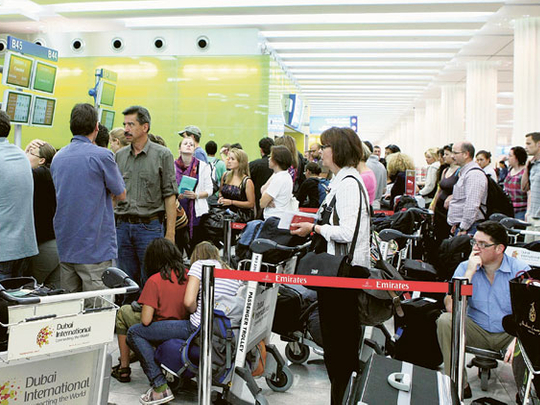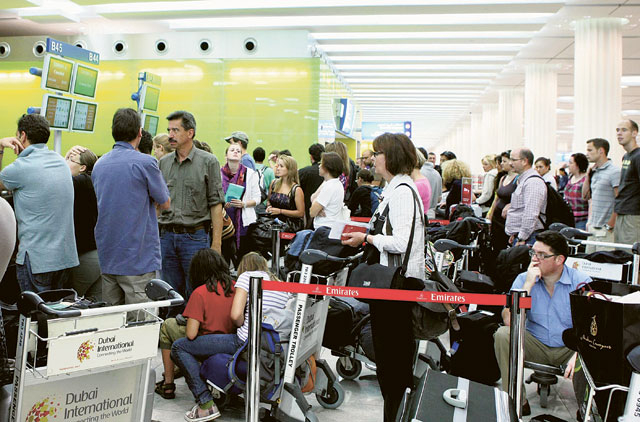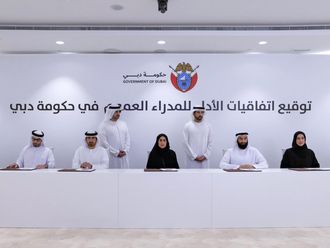
Dubai: Visitors trying to slip into the country using fake identity documents are increasingly being caught at Dubai International Airport thanks to new passport-reading and biometrics technology designed to root out fraud.
In 2011, for example, 1,137 forged documents were discovered by the Expertise Centre Identity and Fraud Documents (ECIFD) at the airport, according to Major General Ahmad Al Merri, Director-General of the General Directorate for Residency and Foreigners' Affairs in Dubai (GDRFA).
The "GDRFA is striving to ensure homeland security by adopting the highest technological standards for detecting the most sophisticated fake passports, thereby improving the ability of our officers at passport control points to identify falsified passports quickly and efficiently," Al Merri told Gulf News.
Global recognition
"We are looking into gaining international recognition with our ultra-modern document fraud detection centre. I look forward to seeing the ECIFD establish itself as a centre of excellence not just for here but in the world," he said.
"In a bid to help verify the identities of millions of travellers passing through Dubai airport each year, the GDRFA is using high-tech passport readers," Michel Oude Veldhuis, consultant of ECIFD, said.
He added that the new efforts are critical because the airport is growing very fast and passenger numbers are climbing.
Veldhuis said that although passports and identity documents are becoming more difficult to copy, criminals will more often commit what is called ‘look-alike fraud', an offence in which someone who looks like the passport-holder tries to enter the country.
Training programmes
The ECIFD stores data on travel documents and identity cards from over 200 countries. It has a library of sample documents and forgeries.
Veldhuis explained that in order to help the immigration officers at the airport to identify valid and forged passports, the ECIFD has trained all the GDRFA staff on the new security system.
The training centre of ECIFD develops and maintains the level of expertise regarding document checks for national and international investigation.
The training programmes are divided into three levels, the first level is aimed at the passport control counter employees.
The second level features more advanced training for the supervisors of these counters, while the third level will target employees of the laboratories used to analyse suspect passports.
The basic level or the front-officer training is to try to identify a counterfeit passport by how genuine the passport looks; if the front officer has any doubt, then it goes to the second level or the advanced level where there will be more equipment.
From there, the passport may be fed to the third level or the expert level which is very important at the airport because it is at this stage when the officer must make a decision.
"We educate the officers on the first and second level. The senior professionals are at the third level," he said. "We have different departments that include visa section, passport control and others at the GDRFA. We need a central facility to monitor them all, and that is where the expertise centre comes in."
Customer service
Customer service is also part of the training.
"We train the officers not only on recognising forged documents but also in customer service," Veldhuis said.
"We want them to be very friendly because they are the first people visitors meet. The officers at the airport make the first impression on visitors."
He explained that every passport check has to be based on a solid evaluation. "We cannot rely on our feelings, the officer must be 100 per cent sure of the accuracy," Veldhuis noted.
He said 20 to 50 officers are sent for a three-week training programmes at any given time.
"We invest in our staff to obtain the right skills. We train them to feel, see and read the document. The officer must recognise the security features in a passport. There could be around 50 features such as the paper quality. All passports are optical and do not reflect."
Body language also matters. People with forged passports are always nervous or try to act smart, Veldhuis said.
Single-step verification
ECIFD ensures that "in a single step, electronic document data may be checked for tampering and at the same time traditional optical features such as logos, crests, laminates, ultraviolet images and other graphical patterns on the page can be authenticated," Veldhuis said.
"The reader can scan and access data contained in the RFID chip, and it also can be used to write and lock data onto the chip during the document-issuance process."
Veldhuis added that through the GDRFA, the UAE is now a contributing member of the Electronic Documentation Information System on Network (Edison) Travel Documents Section Committee.
This system contains images of thousands of genuine and fake travel document samples from over 200 countries for verifying the security features of the documents in question.
The Edison is a kind of library developed by five countries including the US, Australia, Canada, The Netherlands and the UAE. These countries constanntly update this database and that helps in rapid and efficient verification of documents.
Biometric technology: Faster and secure
The Expertise Centre Identity and Fraud Documents (ECIFD) is vital in reliable trend analyses and the adoption of an efficient approach to tackling fraud.
Michel Oude Veldhuis, consultant of ECIFD, said the centre contains the ePassport Authentication Systems to validate biometric identity documents at the airport. This allows the GDRFA staff to quickly screen travellers as the ePassport Authentication Systems provide evidence of document meddling and counterfeiting, in addition to reading biometric and other data stored on the RFID chip of ePassports — the latest generation of travel documents. "Biometric technology is an indisputable way to confirm a person's identity," said Veldhuis.
"We want to make experts in the field of biometrics, analyses and counterfeiting. We are confident that systems will strengthen the security significantly."













